An Interview with Marsh Altman, Author of Mr. Darcy’s Great Escape
 A Contest: The Sourcebooks, the publisher of Mr. Darcy’s Great Escape, is willing to support a giveaway for the US and Canadian readers of this interview. Leave a comment on the post and I will chose a random comment author on Sunday February 7th. I’ll contact the winner to get their snail mail address. Winner will receive one set of three books in the Darcys and Bingleys series).
A Contest: The Sourcebooks, the publisher of Mr. Darcy’s Great Escape, is willing to support a giveaway for the US and Canadian readers of this interview. Leave a comment on the post and I will chose a random comment author on Sunday February 7th. I’ll contact the winner to get their snail mail address. Winner will receive one set of three books in the Darcys and Bingleys series).
Marsha Altman continues the story of The Darcys and the Bingleys in Mr. Darcy’s Great Escape, bringing us to 1812. This is book three of the series following The Darcys and the Bingleys and The Plight of the Darcy Brothers. The books are a delight, continuing the lives of some of literature favorite characters Elizabeth Bennet Darcy and Fitzwilliam Darcy. One reviewer said that “that [these books] would please even Jane Austen.” The more I read about Austen’s wit and humor, the more I do believe that she would appreciate Marsha Altman’s continuation of the story.
It may be Mr. Darcy’s Great Escape but you gave the women a very big role this time. Just how much fun was it to pair up the unlikely duo of Elizabeth and Caroline?
Marsha: A lot of fun, but also a little tricky. Even though nine years have passed since the events of Pride and Prejudice, these women still haven’t completely warmed to each other. Elizabeth is still witty and stubborn, and Caroline has to retain a certain edge to her for her to remain Caroline Bingley, even if she’s now Caroline Maddox. It’s not my attempt to make these characters unrecognizable, even if they do evolve significantly as they go through milestones in their lives, particularly marriage and children. Nor was it appropriate to have them constantly sniping at each other, because their journey was very serious. So I had to find a kind of balance there. Darcy and Dr. Maddox actually have more time to bicker, because they have few ways to pass the time while they’re waiting to be rescued.
So much of this resonated with Bram Stoker’s Dracula only without the vampires but with all the Gothic scariness. There’s even a ninja. Did you intend such a homage? Or am I just seeing a connection you didn’t intend?
Marsha: Just a straight-out correction here: There are two vampires in this story. The book just never says it outright, but the hints are hidden in the details. They reappear in other literature I’ve written that’s not Pride and Prejudice related and is either going to be published soon or I’m hoping will sell later this year. And there are no ninjas, only samurai (book 8 has ninjas).
The homage is entirely intentional, but more for the reader than the characters. To them, Transylvania is a place they’ve never heard of and can’t locate on a map before this story begins, except within the context of Brian Maddox having mentioned it was in Austria somewhere in the previous book. Let’s remember that Dracula by Bram Stoker wasn’t published until 1897, and that book was the formation of the modern vampire legend and its association with Transylvania, whereas previously the legends about vampires were less centralized to a place and more nebulous. Vlad the Impaler, on whom Dracula the character is supposedly based, was actually from Wallachia, not Transylvania, and his legend wasn’t widespread until the book was published. So the name “Transylvania” wouldn’t strike instant fear into the hearts of people in 1812. It would be intimidating for being so far east, beyond the known and safe world of the European Continent even if it was technically part of the Austrian Empire at the time, because of its remoteness. The fear comes from leaving familiar Regency England and traveling into a dangerous backwater area, where the “other” is the real scare, not the supernatural.
Nonetheless I chose Transylvania because it has an instant connotation for my audience, and it does have a wealthy historical tradition of folklore to draw from in the scenes that use it. When you’re in a mysterious place, it’s an easy step to be drawn into the foreboding local tales that might surround it, so it’s a simple jump from “scary count who kills people” to “vampires, witches, and warlocks.”
I should remark that this isn’t totally fair to Romanian history. Transylvania had plenty of European, cosmopolitan nobles who had encountered the Enlightenment and were beyond this nonsense (there’s one in the book), but the villains are particularly backwards to heighten the experience.
It seems with each book that Mr. Darcy has to face some of his inner devils or at least learn to broaden his view of the world and the people in it. Do you enjoy tormenting him? Have you got much more torment in store for him?
Marsha: This is as bad as it ever gets for Darcy. Seriously, I let him off easy from here on. He’s better equipped to deal with strife that involves his family lineage in future books after his experiences in this book. This book was my attempt to stretch as far as I could my interpretation of Darcy. In many circles, there are two schools of thought to explain Darcy’s actions in Pride and Prejudice – either he made his mistakes because he was “proud” and then genuinely learned from his actions and changed his characters, or he was “shy” and misinterpreted, causing multiple misinterpretations on both ends that needed to get cleared up before the right people could get married. Austen provides fodder for both explanations: Mrs. Reynolds, on Elizabeth’s visit to Pemberley, goes out of her way to proclaim that her master has always been good and kind to everyone, and Darcy admits at Rosings that he’s not good in making easy conversation with strangers, leading to the “shy” interpretation. Then you have Darcy at the end saying that he was spoiled as a child and expected only the best, leading to the “proud” interpretation. I’ve always sided with “shy” because it makes Darcy a better man – he’s not a jerk who reformed so much as someone who made bad decisions and then corrected them.
Today we have a larger understanding of people who are uncomfortable around other people, myself being one of them, and don’t have an easy time making new friendships or retaining old ones. For people like this, parties full of strangers can feel like living hell. In extreme examples, you have Social Anxiety Disorder, where people can actually develop shortness of breath in the presence of too many people, and you have medication for it. I don’t believe that these problems didn’t exist in the past, they just weren’t acknowledged or understood. I am not, for the record, diagnosing Darcy with SAD (his symptoms don’t match), but pushed to the edge as he is in this book, the darker side of whatever makes him an unsocial person comes out in full force, and coupled with a genetic predisposition you have a serious problem on your hands that tests not just him but everyone around him. It’s a pretty radical interpretation of Darcy, but I like doing new things.
It appears that Gregoire may be learning to relax a bit. You’ve taken all the characters in new directions that wouldn’t have been expected just one book ago. But, it all feels so consistent with their growth. Can you tell us in some very general terms what we might have to look forward to in future volumes?
Marsha: G-d willing, this series will keep being published by my benevolent publisher Sourcebooks, and the next book will be mostly concerned with Grégoire, and his spiritual evolution after some events force him to return to England. Grégoire is like his half-sister Georgiana in that he believes in the good in everyone, but he’s a Darcy, so that makes him stubborn as hell about the way he wants to live his life, even if it seems in direct conflict with the way a modern person (in Regency terms) should live their life. In the fourth book you also have the emerging characters of the children. George Wickham (the third), Darcy’s half-nephew, is old enough to be in University, and Geoffrey Darcy is about to leave for Eton, and Georgiana Bingley is getting ready to enter society, so the shape of their characters as adults is starting to emerge, and the parents have to take a greater hand in trying to guide them into adulthood, where potential fortune or disaster awaits depending on their behavior. When they’re little kids, you can kind of let them run around and occasionally give them instruction, but the stakes become much higher much faster in their teenage years.
The fifth book, which a lot of my readers on the internet feel is the best book so far (nobody’s had a chance to weigh in on the last book and the Velociraptor-related ending), is the one where most of the children have entered society or are about to do so, and they become instrumental to the conflict and resolution in the story. There are still a lot of young kids running around, but the main cast of the next generation has emerged as players, sometimes to their parents’ disapproval. I didn’t want to write a series where BOOM! the kids are all adults trying to get married and the adults haven’t changed except that they have more gray hair and wear glasses. Books skip ahead a few years to key events, but the evolution is steady and somewhat mapped. Nobody ever stops evolving, because people are always growing, even in their later years.
What’s been the biggest surprise about response to your series?
Marsha: That people who have not read Pride and Prejudice have read it and enjoyed it. My parents re-watched the movie and that helped them out. I really should have included a summary of Pride and Prejudice in an introduction to the first book.
Mr. Darcy’s Great Escape—in stores February 2010
-
Hilarious and action-packed, this installment brings the Darcy and Bingley families to the year 1812 and the intrigues of the Napoleonic Wars. Darcy and Dr. Maddox go in search of Darcy’s missing half-brother and land in a medieval prison cell.
Much to his dismay, Charles Bingley is left to hold the fort at Pemberley while his sister Caroline, Elizabeth, and Col. Fitzwilliam traverse Europe on a daring rescue. Meanwhile, Lady Catherine de Bourgh kicks up a truly shocking scandal. One never knows what might happen next between the estates of Rosings and Pemberley.
 ABOUT THE AUTHOR:
ABOUT THE AUTHOR:
-
Marsha Altman is a historian specializing in Rabbinic literature in late antiquity, and an author. She is also an expert on Jane Austen sequels, having read nearly every single one that’s been written, whether published or unpublished. She has worked in the publishing industry with a literary agency and is writing a series continuing the story of the Darcys and the Bingleys. She lives in New York.




